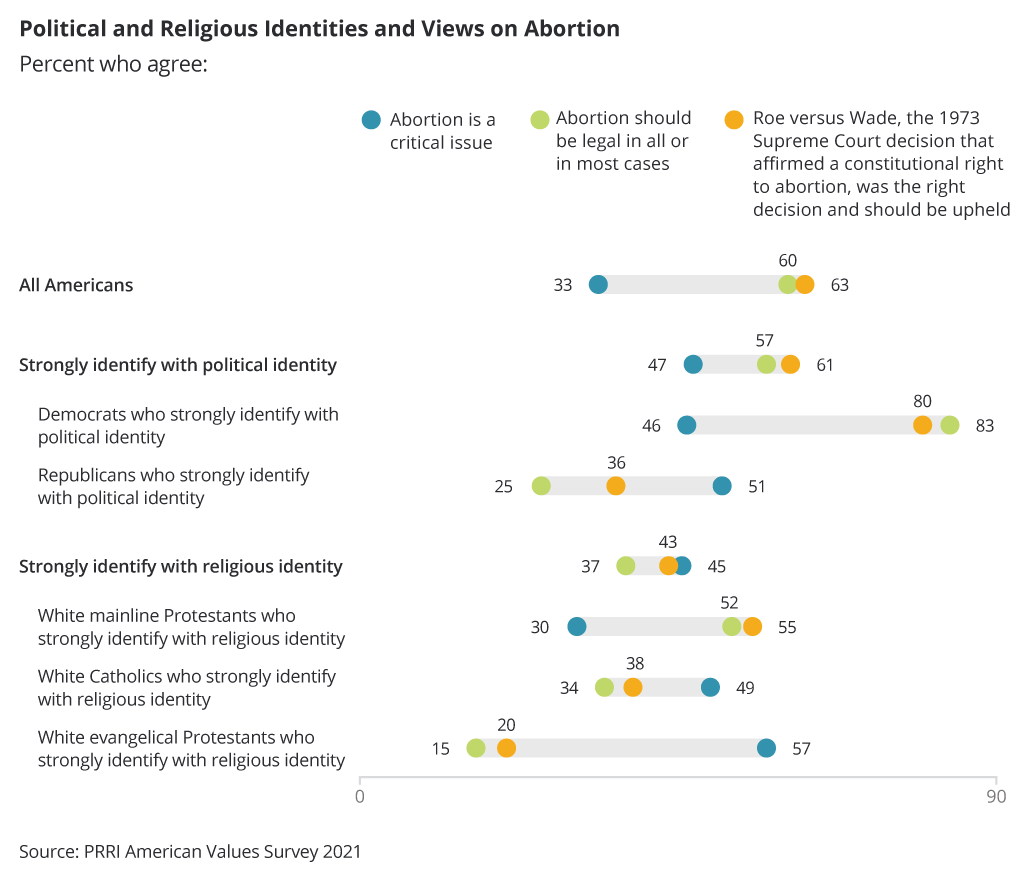Plenty of antiabortion measures have been introduced recently, from Texas’ Supreme Court ruling against abortion providers to Oklahoma’s Senate approving six anti-abortion measures and numerous antiabortion proposals in Missouri and Louisiana. We know that certain political and religious groups are more likely to support these measures, but a question remains: How does the strength of those personal identities relate to views about abortion?[1]
In 2021, PRRI asked a series of questions related to how important personal identities are for Americans. About one-third of Americans (35%) said that their religious identity is the most important or a very important identity in their lives, compared to about one in five (19%) who said their political identity is the most important or a very important identity. White evangelical Protestants (72%) are most likely to say religion is the most important or a very important identity in their lives, while only 32% of white Catholics and 24% of white mainline Protestants say the same. Republicans (26%) and Democrats (24%) are similarly likely to say their political identity is the most important or a very important identity in their lives.
About one-third of Americans (33%) said that abortion is a critical issue, but this percentage went up to nearly half among those who identify strongly with their political identity (47%) and with their religious identity (45%). Interestingly, differences between Republicans and Democrats who strongly identify with their political identity are not statistically significant (51% vs. 46%). A majority of white evangelicals who strongly identify with their religious identity (57%) and nearly half of white Catholics who strongly identify with their religious identity (49%) say that abortion is a critical issue, compared to only 30% of white mainline Protestants who strongly identify with their religious identity.
Sixty percent of Americans think that abortion should be legal in most or all cases, while 38% say it should be illegal in all or in most cases. Among those who identify strongly with their political identity, 57% say abortion should be legal in most or all cases. Democrats who identify strongly with their political identity are more than three times more likely to say abortion should be legal in most or all cases than Republicans who identify strongly with their political identity (83% vs. 25%). Among those who identify strongly with their religious identity, 37% say abortion should be legal in most or all cases and 62% say abortion should be illegal in most or in all cases. More than eight in ten white evangelical Protestants who identify strongly with their religious identity (83%) say abortion should be illegal in most or all cases, as do about two-thirds of white Catholics who identify strongly with their religious identity (64%) and 46% of white mainline Protestants who identify strongly with their religious identity.

The survey also asked Americans if they agree or disagree with the statement, “Roe v. Wade, the 1973 Supreme Court decision that affirmed a constitutional right to abortion, was the right decision and should be upheld.” A majority of Americans agree (63%) and one-third (33%) disagree.
About six in ten Americans who identify strongly with their political identity (61%) agree that Roe v. Wade was the right decision and should be upheld, as do 43% of Americans who identify strongly with their religious identity. Democrats who identify strongly with their political identity are substantially more likely than Republicans who identify strongly with their political identity to agree with this statement (80% vs. 36%). By contrast, the majority who strongly identify with their religious identity (55%) disagree that Roe v. Wade was the right decision and should be upheld. White evangelical Protestants who strongly identify with their religious identity (78%) are particularly likely to disagree, and a majority of white Catholics who strongly identify with their religious identity (60%) disagree as well. White mainline Protestants who strongly identify with their religious identity tend to agree more than disagree on this question (44% disagree vs. 55% agree).
[1] https://www.washingtonpost.com/politics/2022/03/11/texas-supreme-court-rules-against-abortion-providers-federal-challenge-restrictive-state-law/
https://www.washingtonpost.com/politics/2022/03/08/missouri-abortion-ban-texas-supreme-court/
https://www.nytimes.com/2022/04/06/us/oklahoma-abortion-ban.html
https://www.wafb.com/2022/03/09/state-lawmaker-proposes-plan-crack-down-abortion-pills/